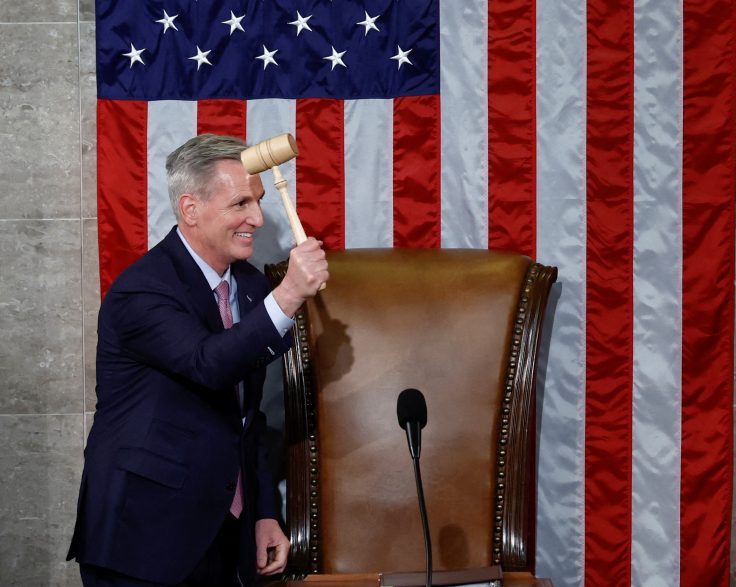Speaker Kevin McCarthy (R., Calif.) wasn’t going to let the moment go unnoticed. It was April 26, and the House of Representatives had just passed, by a vote of 217 to 215, the Limit, Save, Grow Act of 2023. The bill would raise the debt ceiling, return discretionary spending to fiscal year 2022 levels, repeal much of last year’s Inflation Reduction Act, speed up infrastructure permitting, cancel President Joe Biden’s student loan amnesty, and apply work requirements to Medicaid and food stamps. The legislation is dead on arrival in the Democratic-controlled Senate. Yet plenty of Washingtonians doubted that it would ever leave the House.
McCarthy had beaten expectations. Again. And he wanted to let the world know it. "Every question you continue to raise," he told the media, "you guys have been wrong. You’ve underestimated us."
Many people have. Conventional wisdom is set against McCarthy, who presides over a 222-213 Republican majority and can afford to lose only four votes on a given bill or resolution. His bid for speaker appeared doomed right up until the moment that he won the office on the 15th ballot. Press coverage focuses almost entirely on divisions within the GOP conference, leading to a sense of surprise in the Beltway whenever the House comes together to rescind funding for additional IRS agents, incentivize oil and gas exploration and production, repeal onerous environmental and financial regulations, broaden parental rights in education, and hike the debt limit.
Meanwhile, the Select Committee on the Chinese Communist Party is off to a strong and bipartisan start. Rep. Jim Jordan’s (R., Ohio) Judiciary Committee won its fight with Manhattan district attorney Alvin Bragg. Rep. James Comer’s (R., Ky.) Oversight Committee is building its case against Biden family influence peddling. Compared with past Congresses, the legislative and investigative process under McCarthy may be slow and unpredictable. But they are working.
Indeed, on two occasions Speaker McCarthy has outplayed Biden and the Democrats. In February the House voted 250-173 to overturn D.C.’s incorrigible criminal justice reform. The next month, the resolution passed the Senate and Biden signed it into law. Also in February, the House voted 229-197 to end the national COVID emergency. And again, the next month, the resolution passed the Senate and Biden signed it into law. House Democrats were outraged that Biden ultimately sided with these House Republican initiatives. But the politics were on McCarthy’s side. And the same was the case last year, when then-minority leader McCarthy forced an end to the military’s COVID vaccine mandate.
The Limit, Save, Grow Act may not become law, but it holds symbolic value for the speaker. For months, McCarthy has wanted to enter negotiations with Biden on raising the debt ceiling. The president has refused. McCarthy wants to follow the precedent of earlier GOP Houses and leverage a debt ceiling raise for spending cuts and budget reforms. Biden doesn’t want to play that game. The standoff persists. Default on U.S. government obligations draws near.
McCarthy understands that his negotiating position will improve if House Republicans appear to be doing what they can to avoid default. He wants Biden, not his conference, to look obdurate and uninterested in the potential economic fallout. Two weeks ago, McCarthy traveled to the New York Stock Exchange and pledged that the House would vote on a bill that raised the debt limit while reducing spending. It did. By demonstrating unity and seriousness of purpose, House Republicans have put the ball in Biden’s court. And congressional Democrats from swing districts and battleground states—who are given to low-level political anxiety on the best of days—will tell the White House that talks with McCarthy may well be in order.
The situation could have been much worse for Republicans. If the Limit, Save, Grow Act had failed, then the GOP would have been in disarray, McCarthy would have looked hapless, Biden would have been able to tell Democrats that his strategy is working, and pressure would build on Senate leaders Chuck Schumer (D., N.Y.) and Mitch McConnell (R., Ky.) to figure out a compromise. McCarthy avoided that scenario. How? By following the method that won him the speakership.
Call it "concede to lead." To become speaker, McCarthy gave the House Freedom Caucus enormous influence over committees, floor activity, and the legislative calendar. By drawing the Freedom Caucus into the inner circle—and by giving its members seats on the prestigious Rules Committee—McCarthy turned outsiders into insiders. His conservative outreach delivered results when outside groups normally opposed to GOP leadership, such as Heritage Action and the Center for Renewing America, came onboard the Limit, Save, Grow Act.
Similarly, when Republican members from corn states demanded that ethanol subsidies remain untouched in the debt ceiling bill, McCarthy agreed with them. And when conservatives wanted more stringent work requirements, he said yes again. McCarthy knows that the bill won’t become law. There’s little cost in such concessions. He’s willing to accommodate practically everyone, so long as it helps him attain his desired end. In January, his goal was becoming speaker. This week, it was passing Limit, Save, Grow. McCarthy is practicing a Republican form of diversity, equity, and inclusion that encompasses the moderates in the New York delegation, conservatives from Texas, and Marjorie Taylor Greene (R., Ga.).
Success is far from assured. The Limit, Save, Grow Act is an opening gambit, not part of the endgame. No number of concessions may be enough to persuade 218 Republicans to back a deal this summer that lifts the debt ceiling for a few budget victories but not much else. Some in the GOP may want to see just how much a default would really hurt.
Right now, though, Speaker McCarthy can enjoy another win. Don't underestimate him again.
